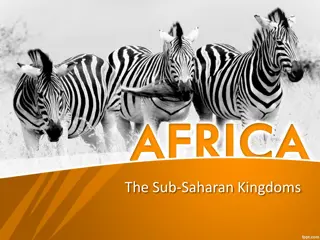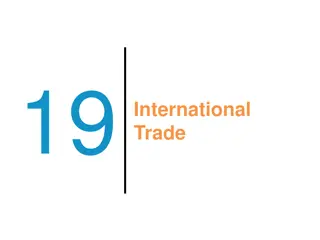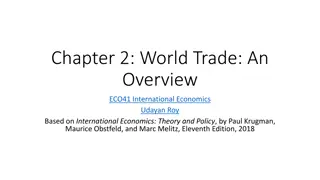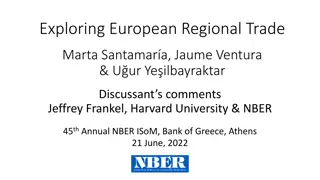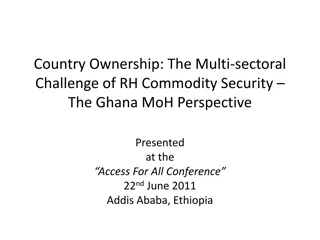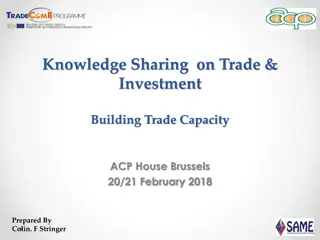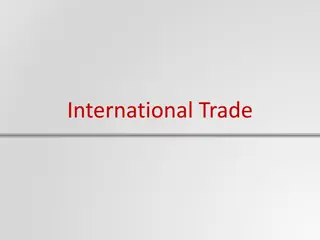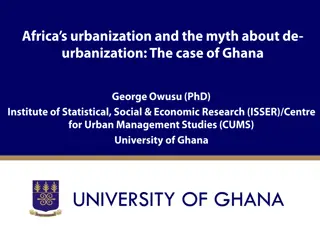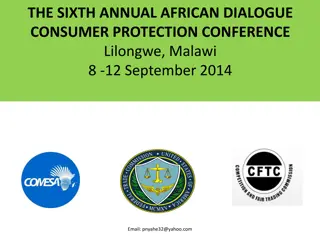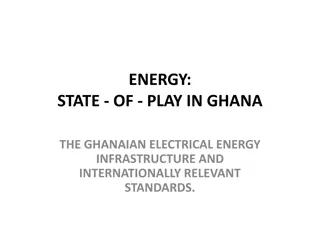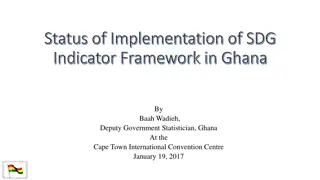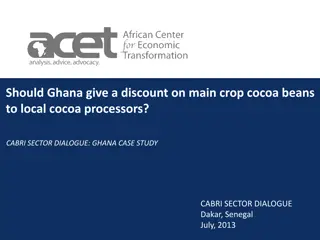Trade Influence on the People of Ghana
The Empire of Ghana thrived as a key trading hub in West Africa from 300 to 1235 AD. Trade influx brought wealth, advanced weaponry, and diverse goods like gold, salt, and ceramics. The capital, Koumbi, was divided into sections for Muslim traders and locals, showcasing cultural and economic vibrancy. The Soninke kings' wealth and power grew due to their successful iron weapons and strategic trade practices.
Download Presentation

Please find below an Image/Link to download the presentation.
The content on the website is provided AS IS for your information and personal use only. It may not be sold, licensed, or shared on other websites without obtaining consent from the author. Download presentation by click this link. If you encounter any issues during the download, it is possible that the publisher has removed the file from their server.
E N D
Presentation Transcript
Lesson 2: The Empire of Ghana (pp. 112-117) THINKING FOCUS What effect did trade have on the people of Ghana? KEY TERMS Matrilineal Patrilineal (Mom & Pop)
A New Trade Center Between the 700s and 1500s, large trading empires flourished in West Africa. Ghana was an ancient agricultural kingdom of the Soninke people. Berber tribes from North Africa raised horses and camels.
More trade Rich in gold and centrally-located, Ghana became the first of the African trading empires, lasting from around A.D. 300 to 1235. From the south came kola nuts, palm oil, copper, and gold. From the north, came imported items like ceramics, glass and oil lamps--and, of course, salt. Taxes collected on goods passing through Ghana allowed the empire to grow wealthy.
Iron helps Under the Soninke kings, Ghana became a wealthy trading empire. The Soninke easily conquered neighboring peoples because their iron weapons were far superior to the stone ones of their opponents. (How will they stand up against guns!)
A Divided Capital In Koumbi, Ghana's capital, the gold and salt trade created the wealthiest marketplace in West Africa. Koumbi's market people also bought and sold cattle, honey, dates, cloth, ivory, and ebony. In other shops at the market, local farmers sold their produce and craftspeople sold their wares.
More The city of Koumbi, like many Ghana trading cities, was divided into two sections -- one to house the Muslim traders, the other to house local people. A six-mile-long boulevard linked the two sections of Koumbi.
A Tale of Two Cities The Muslim side had 12 mosques and the homes of Muslim traders. Many of the buildings there were constructed of stone, and some had two stories. This section was also home to the huge Koumbi market. The Soninke section of the capital looked very different. It was a walled city, and most of its one-story houses were made of wood or clay, with straw roofs. The king lived in this section in a large wood and stone palace.
The former capital of the Ghana Empire. It lies in what is now south east Mauritania. Image:Flag of Mauritania.svg
New Religion Arab merchants trading in West Africa brought not only valuable goods, but also new ideas about writing, numbers, and religion. Arab traders brought the first system of writing and numbers to West Africa. Many West Africans converted to Islam, and some who did still did not give up all of their traditional beliefs and practices.
Conversion to Islam Among the first of the converts to Islam were the Mandinke people from the southern Sahara, who served as middlemen in trade between Arab caravans and Wangara gold miners. The Mandinke formed small trade companies that made contact with many different people. They spread Islamic ideas throughout West Africa.
Traditions Other Islamic practices were harder for the Ghanaians to accept. Muslims, for example, had their own idea about the succession of kings. In Ghana when a king died, he was not succeeded by his own son but by the son of his sister. This system of tracing succession through the females of the family is known as matrilineal succession. Muslims, on the other hand, practiced patrilineal succession, in which the throne passes from father to son.
A Fallen Empire Along the northernmost coast of Africa, Berber peoples ruled the region called the Maghreb. In the mid-1000s, invaders made war for control of Ghana. Eventually, the neighboring kingdom of Mali overthrew the Soninke king and became the major power in West Africa.
More King Sumanguru, who wanted to rebuild Ghana's empire, ruled one of these kingdoms. In 1203, he overthrew the Soninke king and took over Koumbi. Meanwhile, a new kingdom to the east called Mali, ruled by the Mandinke, was steadily gaining power. In 1235, the king of Mali defeated Sumanguru and Mali replaced Ghana as the major power in West Africa.
Section 2: Section 2: Kingdoms and States of Africa Kingdoms and States of Africa Kingdom of Ghana Emerged c. 500 AD and was located in the upper Niger River Valley, between the Sahara and the tropical rain forests along the West African coast. The area was agricultural. The leaders were strong rulers who governed without any laws. They played an active role in running the kingdom and they were very wealthy.
The Land of Gold Gold The kings of Ghana had well trained armies and used them as their basis for power. Ghana also had a great supply of gold. This gold was traded for salt which was used to preserve their food and to also help prevent dehydration in the hot climate.
The Kingdom of Ghana Emerged in 5thcentury. Located on the upper Niger River valley, between the Sahara & the tropical forests along Western African coast. Strong rulers without any laws. Had large army to protect kingdom. Most people were farmers. Prospered due to an abundant supply of iron ore & gold. Traded for metal goods, textiles, horses, & salt. Salt important- preserve & flavor food and replace body salt. Skilled in making tools & weapons from iron ore. Berbers took trade across desert using camels. Flourished for several hundred years and collapsed due to wars around 1200.
What was Ghana? an empire in West Africa
What twp items did the economy of Ghana depend on for trade? Gold and salt
How did the people of Ghana increase the value of the gold they traded? By keeping the gold a secret
How did the king of Ghana get rich? By taxing trade
What religion did Ghanas kings follow? Both Islam and traditional African religions


